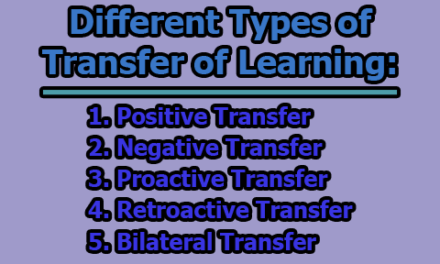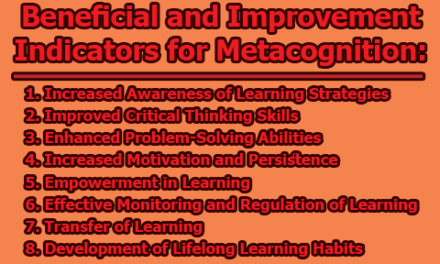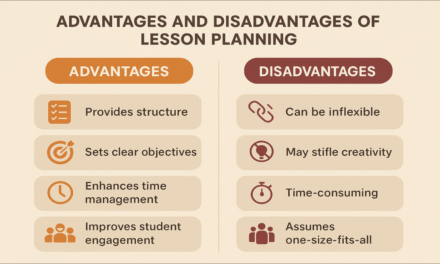The Effects of Shared Metacognition:
Metacognition is the awareness of one’s own thinking and learning processes. It is a crucial component of learning, as it allows learners to monitor and regulate their own thinking and learning. Shared metacognition is a collaborative process where learners reflect on their learning processes and work together to develop a deeper understanding of the subject. The purpose of this study is to examine the effects of shared metacognition on learning and to explore the ways in which it can be implemented in the classroom.
Creating Understanding Associated with Self and Others:
Shared metacognition involves reflecting on one’s own learning processes and strategies and sharing them with others. This process can lead to a deeper understanding of self and others. By reflecting on their own learning processes, learners can gain insights into their own strengths and weaknesses and develop a more nuanced understanding of their own thinking and learning processes. Additionally, by sharing their thoughts and strategies with others, learners can gain insights into the thought processes and strategies of their peers. This can lead to a greater appreciation of diversity and different perspectives and can help to foster a sense of community and collaboration among learners.
To Develop the Community of Inquiry Framework:
The Community of Inquiry (CoI) framework is a theoretical model that describes the processes involved in creating a meaningful and effective learning experience. The CoI framework consists of three elements: cognitive presence, social presence, and teaching presence.
Shared metacognition can help to develop each of these elements of the CoI framework. By encouraging learners to reflect on their own learning processes, shared metacognition promotes cognitive presence. Cognitive presence refers to the extent to which learners are able to construct and confirm meaning through sustained reflection and discourse. By working together to reflect on their learning processes and share their thoughts and strategies, learners can develop social presence. Social presence refers to the ability of learners to project their personal characteristics into the community of inquiry, thereby presenting themselves as real people who are engaged in the learning process. Finally, by facilitating group discussions and peer review activities, teachers can develop a teaching presence. Teaching presence refers to the design, facilitation, and direction of cognitive and social processes for the purpose of realizing personally meaningful and educationally worthwhile learning outcomes.
To Set the Situations for Thinking and Learning Collaboratively:
Shared metacognition requires learners to think and learn collaboratively. By working together to reflect on their own learning processes and develop new strategies, learners can develop a deeper understanding of the subject and improve their academic performance. Shared metacognition can also help to develop critical thinking skills, as learners are required to evaluate their own thinking processes and the thinking processes of their peers.
To Justify Own Learning Capabilities:
Another benefit of shared metacognition is that it helps learners to justify their own learning capabilities. By reflecting on their own learning processes and developing new strategies, learners can gain a deeper understanding of their own abilities and potential. This can help to build confidence and self-efficacy, which can lead to improved academic performance and greater success in life.
To Make Awareness and Responsibility for Observing and Dealing a Complex Shared Learning:
Shared metacognition can also help to develop learners’ awareness and responsibility for observing and dealing with complex shared learning. In a shared metacognitive environment, learners are required to take responsibility for their own learning and to work collaboratively with others to develop new strategies and approaches. This can help learners to develop a sense of ownership and responsibility for their own learning, which can lead to improved academic performance and greater success in life.
To implement shared metacognition in the classroom, teachers can use a range of strategies and approaches. One approach is to explicitly teach metacognitive strategies to learners, such as goal-setting, self-monitoring, and self-evaluation. Another approach is to create a supportive and collaborative learning environment, where learners are encouraged to work together to reflect on their learning processes and strategies. This can involve activities such as group discussions, peer review, and collaborative projects. Teachers can also use technology to facilitate shared metacognition, for example, by using online discussion forums or collaborative writing tools.
From the above discussion, we can say that shared metacognition has the potential to revolutionize the way we teach and learn. By promoting a deeper understanding of self and others, developing the CoI framework, promoting collaborative thinking and learning, justifying own learning capabilities, and developing awareness and responsibility for observing and dealing with complex shared learning, shared metacognition can lead to improved academic performance, greater collaboration, and more autonomous learners. Teachers can incorporate shared metacognition into their teaching practices by using a range of strategies and approaches, and by doing so, can foster a culture of collaboration and reflection among their learners.
References:
- Kramarski, B., & Mevarech, Z. R. (2003). Enhancing mathematical reasoning in the classroom: The effects of cooperative learning and metacognitive training. American Educational Research Journal, 40(1), 281-310.
- Mercer, N., & Littleton, K. (2007). Dialogue and the development of children’s thinking: A sociocultural approach. Routledge.
- Schraw, G., & Dennison, R. S. (1994). Assessing metacognitive awareness. Contemporary Educational Psychology, 19(4), 460-475.
- Stahl, G., Koschmann, T., & Suthers, D. (2006). Computer-supported collaborative learning: An historical perspective. Cambridge Handbook of the learning sciences, 409-426.
- Veenman, M. V. J., Wilhelm, P., & Beishuizen, J. J. (2004). The relation between intellectual and metacognitive skills from a developmental perspective. Learning and Instruction, 14(1), 89-109.

Library Lecturer at Nurul Amin Degree College










